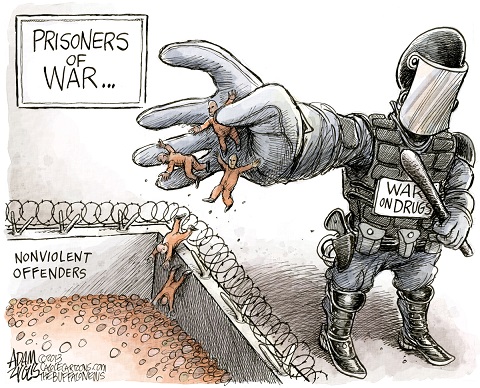
In past blogs I wrote about the “Prison Paradox“–the idea that incarceration in America has gotten so out of control that it may actually increase crime by creating a poverty trap and perpetuating prison culture.
I wrote about the topic from the vantage point of an enlightened society that was seemingly moving in the right direction on the issue. While this is still the case at the state level, a recent Justice Department directive by Attorney General Jeff Session threatens to undo recent progress:
In an eight-paragraph memo, Mr. Sessions returned to the guidance of President George W. Bush’s administration by calling for more uniform punishments — including mandatory minimum sentences — and instructing prosecutors to pursue the harshest possible charges. Mr. Sessions’s policy is broader than that of the Bush administration, however, and how it is carried out will depend more heavily on the judgments of United States attorneys and assistant attorneys general as they bring charges.
The policy signaled a return to “enforcing the laws that Congress has passed,” Mr. Sessions said Friday at the Justice Department, characterizing his memo as unique for the leeway it afforded prosecutors.
“They deserve to be un-handcuffed and not micromanaged from Washington,” he said. “It means we are going to meet our responsibility to enforce the law with judgment and fairness.”
Mr. Sessions’s memo replaced the orders of former Attorney General Eric H. Holder Jr., who in 2013 took aim at drug sentencing rules. He encouraged prosecutors to consider the individual circumstances of a case and to exercise discretion in charging drug crimes. In cases of nonviolent defendants with insignificant criminal histories and no connections to criminal organizations, Mr. Holder instructed prosecutors to omit details about drug quantities from charging documents so as not to trigger automatically harsh penalties.
People of all races use drugs at roughly same rate, but minorities are disproportionately imprisoned for drug related offenses. Meanwhile, “White America” is currently experiencing the well documented “opioid epidemic”. Drug abuse, treatment, and incarceration should be issues that transcend racial barriers.
On the micro level, drug related criminal justice reform that prioritizes treatment over prison can keep families together. It can keep people in the labor force and in productive society, instead of exposing them to hardened criminals in prison (potentially turning minor offenders into career criminals). Even when prison doesn’t “harden” someone, difficulties finding employment can lead to recidivism (re-incarceration) among ex-cons.
On the macro level it saves money on incarceration and welfare programs. As the “War on Drugs” is no longer achieving its goal–reducing crime–what these funds are spent on is largely irrelevant. Liberals would probably like to see more social programs and public goods. Conservatives would probably like to see more defense spending or a reduction in government debt. This debate can be had once the savings are realized and the socially damaging policies are reversed.
Attorney General Session’s directive claims to give judges more freedom, but it does the opposite. All Holder’s directive did was allow judges to consider the facts of the case before delivering a sentence. It did not prevent them from doling out severe sentences when the situation dictated it. Session’s directive takes this freedom away from judges.
There is no significant public support for this stricter rule. 14 States Attorneys General have written a letter asking Sessions to rescind the rule. Rand Paul has reintroduced bipartisan legislation to ease mandatory minimum sentences, which would override the Session ruling. Unfortunately, based on the current political climate, I wouldn’t count on such legislation getting passed anytime soon.
